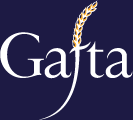Grain and Feed Trade Association
The Grain and Feed Trade Association or GAFTA is an international, London headquartered trade association consisting of traders, brokers, superintendents, analysts, fumigators, arbitrators and other professionals in the international grain trade.
 | |
| Formation | November 17, 1871 (under GAFTA = 1971[1]) |
|---|---|
| Legal status | Trade Association |
| Headquarters | London, WC2 United Kingdom |
| Location |
|
| Services | Contracts, Arbitration, Gafta Trade Assurance Scheme (GTAS), Trade Policy, Education and Training, Events |
Membership | Over 1950 Members in 94 countries |
President | Mr Gavin Millar |
Director General | Mrs Jaine Chisholm Caunt |
| Website | www |
History and Development[2]
Gafta can trace its origins back to 1878, when the London Corn Trade Association (LCTA) was established by members of the corn trade to protect their interests. The LCTA sought to achieve this through the adoption of standard forms of contract, drawn up by the association, with any disputes arising out of these contracts being settled by arbitration rather than legislation. Disputes were referred to London and conducted under English Law.
In 1906, a group of traders broke away from the LCTA and formed a new more specialised association, the London Cattle Food Trade Association (LCFTA), for those trading in vegetable proteins used as animal feedingstuffs. In 1965, the LCFTA dropped ‘London’ from its title, reflecting growing internationalisation. In 1969, merger talks commenced between the LCTA and CFTA. The outcome of these talks was the formation of a new joint association, the Grain and Feed Trade Association in 1971.
In 2008 the International General Produce Association (IGPA) joined the Grain and Feed Trade Association.
GAFTA is headquartered in Holborn, London and currently operates four more offices in Beijing, Geneva, Kiev and Singapore.
Goals and main objectives
GAFTA sets out to promote international trade and protect the interests of its members. Activities include definition and regulation of
- Quality standards, conditions of trade, guaranties
- Shipping documents and delivery conditions
- Terms of payment
- Dealing with problems and extraordinary circumstances
- Insurance
- Non-Fulfillment
- Weighting rules, sampling, analysis and insurance
Impact
According to the Indian Financial Express, 80 percent of world trade with grains is regulated under GAFTA-conditions.[3]
See also
- Federation of Oils, Seeds and Fats Associations (FOSFA)
- Refined Sugar Association
Literature
- Hugh Barty-King Food for Man and Beast: The Story of the London Corn Trade Association, the London Cattle Food Trade Association and the Grain and Feed Trade Association, 1878–1978, London: Hutchinson, 1978
References
- History Archived 2011-09-05 at the Wayback Machine of the Bristol Corn and Feed Trade Association, read May 5th 2010
- About Gafta
- Financial Express Online read Mai 12th 2010